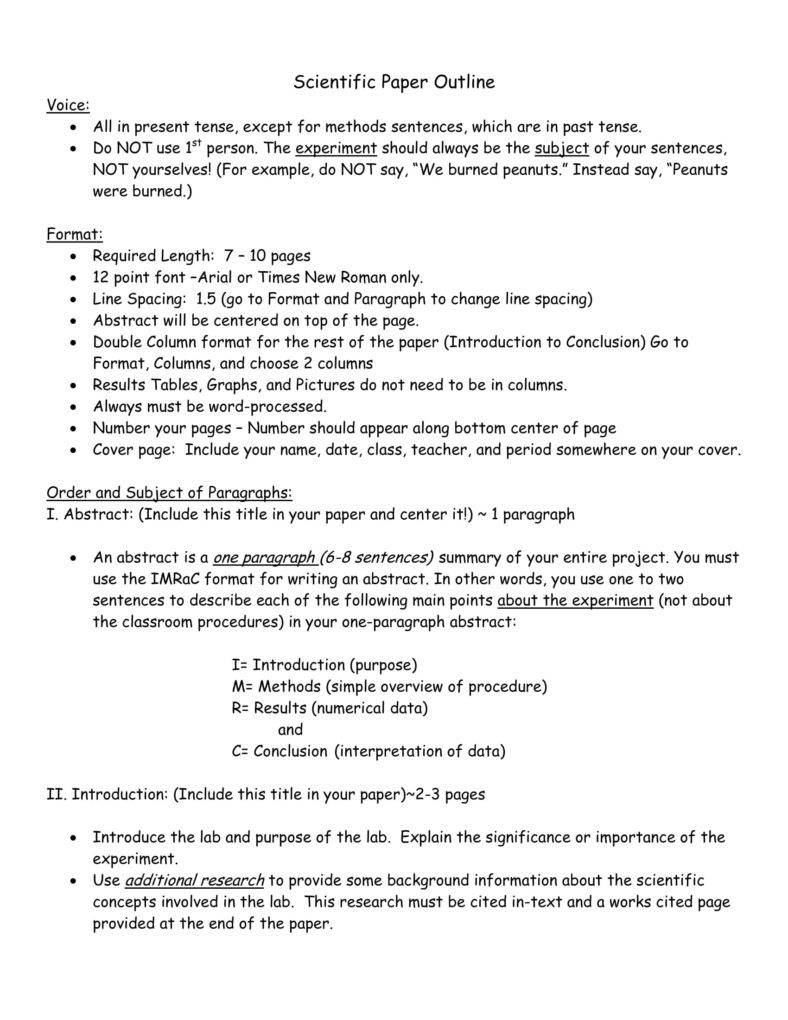
How do I create an outline? Determine the purpose of your paper. Determine the audience you are writing for. Develop the thesis of your paper. Then: Brainstorm: List all the ideas that you want to include in your paper. Organize: Group related ideas together. Order: Arrange material in subsections from general to specific or from abstract to concrete Before writing an research paper outline: Select an appropriate topic. Selecting a topic is a crucial factor for a successful research paper. Whether you select a State your argument. After selecting a topic, take some time to figure out what kind of argument you want to support. Define the Jul 27, · Identify the research problem. The research problem is the focal point from which the rest of the outline flows. Try to Identify the main categories. What main points will you analyze? The introduction describes all of your main points; the Create the first category. What is the first point Author: Robert V. Labaree
How to Write a Research Paper Outline: A Step-by-Step Guide | Edusson Blog
An outline is help making an outline for a research paper formal system used to develop a framework for thinking about what should be the organization and eventual contents of your paper. An outline helps you predict the overall structure and flow of a paper. Why and How to Create a Useful Outline. The Writing Lab and The OWL.
Purdue University. Writing papers in college requires you to come up with sophisticated, complex, and sometimes very creative ways of help making an outline for a research paper your ideas. Taking the time to draft an outline can help you determine if your ideas connect to each other, what order of ideas works best, where gaps in your thinking may exist, or whether you have sufficient evidence to support each of your points.
It is also an effective way to think about the time you will need to complete each part of your paper before you begin writing. A good outline is important because :. How to Structure and Organize Your Paper. University of Washington; Why and How to Create a Useful Outline.
Purdue University; Lietzau, Kathleen. Creating Outlines. Writing Center, University of Richmond, help making an outline for a research paper. General Approaches. There are two general approaches you can take when writing an outline for your paper:. The topic outline consists of short phrases. This approach is useful when you are dealing with a number of different issues that could be arranged in a variety of different ways in your paper.
Due to short phrases having more content than using simple sentences, they create better content from which to build your paper. The sentence outline is done in full sentences. This approach is useful when your paper focuses on complex issues in detail. The sentence outline is also useful because sentences themselves have many of the details in them needed to build a paper and it allows you to include those details in the sentences instead of having to create an outline of short phrases that goes on page after page.
Steps to Making the Outline. A strong outline details each topic and subtopic in your paper, organizing these points so that they build your argument toward an evidence-based conclusion. Writing an outline will also help you focus on the task at hand and avoid unnecessary tangents, logical fallacies, and underdeveloped paragraphs. Once you have developed the basic outline of the paper, organize the contents to match the standard format of a research paper as described in this guide.
Things to Consider When Writing an Outline. Muirhead, Brent. Purdue University; How to Make an Outline. Psychology Writing Center. University of Washington; Kartawijaya, Sukarta.
Hunter College; Organization: Standard Outline Form. Hunter College; Outlining. Department of English Writing Guide. George Mason University; Plotnic, Jerry. Organizing an Essay. University College Writing Centre. University of Toronto; Reverse Outline. The Writing Center. University of North Carolina; Reverse Outlines: A Writer's Technique for Examining Organization. Writing Center. University of Wisconsin, Madison; Using Outlines. Writing Tutorial Services, Center for Innovative Teaching and Learning.
Indiana University; Writing: Considering Structure and Organization. Institute for Writing Rhetoric. Dartmouth College. A Disorganized Outline Means a Disorganized Paper!
If, in writing your paper, it begins to diverge from your outline, this is very likely a sign that you've lost your focus. How do you know whether to change the paper to fit the outline, or, that you need to reconsider the outline so that it fits the paper? A good way to check your progress is to use what you have written to recreate the outline. This is an effective strategy for assessing the organization of your paper.
If the resulting outline says what you want it to say and it is in an order that is easy to follow, then the organization of your paper has been successful. If you discover that it's difficult to create an outline from what you have written, then you likely need to revise your paper. USC Libraries Research Guides Organizing Your Social Sciences Research Paper Making an Outline.
Search this Guide Search. Organizing Your Social Sciences Research Paper Offers detailed guidance on how to develop, organize, and write a college-level research paper in the social and behavioral sciences. Purpose of Guide Types of Research Designs Design Flaws to Avoid Independent and Dependent Variables Glossary of Research Terms 1. Choosing a Research Problem Reading Research Effectively Narrowing a Topic Idea Broadening a Topic Idea Extending the Timeliness of a Topic Idea 2.
Preparing to Write Academic Writing Style Choosing a Title Making an Outline Paragraph Development 3. The Abstract Executive Summary 4. The Introduction The C. The Literature Review Citation Tracking Content Alert Services Evaluating Sources Primary Sources Secondary Sources Tiertiary Sources What Is Scholarly vs.
The Methodology Qualitative Methods Quantitative Methods 7. The Results Using Non-Textual Elements 8. The Discussion Limitations of the Study 9. The Conclusion Appendices Proofreading Your Paper Common Grammar Mistakes Writing Concisely Citing Sources Avoiding Plagiarism Footnotes or Endnotes?
Further Readings Annotated Bibliography Giving an Oral Presentation Group Presentations Dealing with Nervousness Using Visual Aids Grading Someone Else's Paper How to Manage Group Projects Types of Structured Group Activities Group Project Survival Skills Writing a Book Review Multiple Book Review Essay Reviewing Collected Works Writing a Case Study Writing a Field Report About Informed Consent Writing Field Notes Writing a Policy Memo Writing a Research Proposal Acknowledgments Bibliography.
Definition An outline is a formal system used to develop a framework for thinking about what should be the organization and eventual contents help making an outline for a research paper your paper, help making an outline for a research paper. Importance of A good outline is important because : You will be much less likely to get writer's block.
An outline will show where you're going and how to get there. Use the outline to set goals for completing each section of your paper. It will help you stay organized and focused throughout the writing process and help ensure proper coherence [flow of ideas] in your final paper.
However, the outline should be viewed as a guide, not a straitjacket. As you review the literature or gather data, the organization of your paper may change; adjust your outline accordingly.
A clear, detailed outline ensures that you always have something to help re-calibrate your writing should you feel yourself drifting into subject areas unrelated to the research problem.
Use your outline to set boundaries around what you will investigate. The outline can be key to staying motivated. You can put together an outline when you're excited about the project and everything is clicking; making an outline is never as overwhelming as sitting down and beginning help making an outline for a research paper write a twenty page paper without any sense of where it is going.
An outline helps you organize multiple ideas about a topic. Most research problems can be analyzed from a variety of perspectives; an outline can help you sort out which modes of analysis are most appropriate to ensure the most robust findings are discovered. An outline not only helps you organize your thoughts, but it can also serve as a schedule for when certain aspects of your writing should be accomplished.
Review the assignment and highlight the due dates of specific tasks and integrate these into your outline. If your professor has not created specific deadlines, help making an outline for a research paper, create your own deadlines by thinking about your own writing style and the need to manage your time around other course assignments. Structure and Writing Style I.
General Approaches There are two general approaches you can take when writing an outline for your paper: The topic outline consists of short phrases. Steps to Making the Outline A strong outline details each topic and subtopic in your paper, organizing these points so that they build your argument toward an evidence-based conclusion.
Identify the research problem. The research problem is the focal point from which the rest of the outline flows. Try to sum up the point of your paper in one sentence or phrase. It also can be key to deciding what the title of your paper should be. Identify the main categories. What main points will you help making an outline for a research paper The introduction describes all of your main points; the rest of your paper can be spent developing those points.
Create the first category. What is the first point you want to cover? If the paper centers around a complicated term, a definition can be a good place to start.
My Step by Step Guide to Writing a Research Paper
, time: 9:15
Before writing an research paper outline: Select an appropriate topic. Selecting a topic is a crucial factor for a successful research paper. Whether you select a State your argument. After selecting a topic, take some time to figure out what kind of argument you want to support. Define the Jul 27, · Identify the research problem. The research problem is the focal point from which the rest of the outline flows. Try to Identify the main categories. What main points will you analyze? The introduction describes all of your main points; the Create the first category. What is the first point Author: Robert V. Labaree How do I create an outline? Determine the purpose of your paper. Determine the audience you are writing for. Develop the thesis of your paper. Then: Brainstorm: List all the ideas that you want to include in your paper. Organize: Group related ideas together. Order: Arrange material in subsections from general to specific or from abstract to concrete

No comments:
Post a Comment